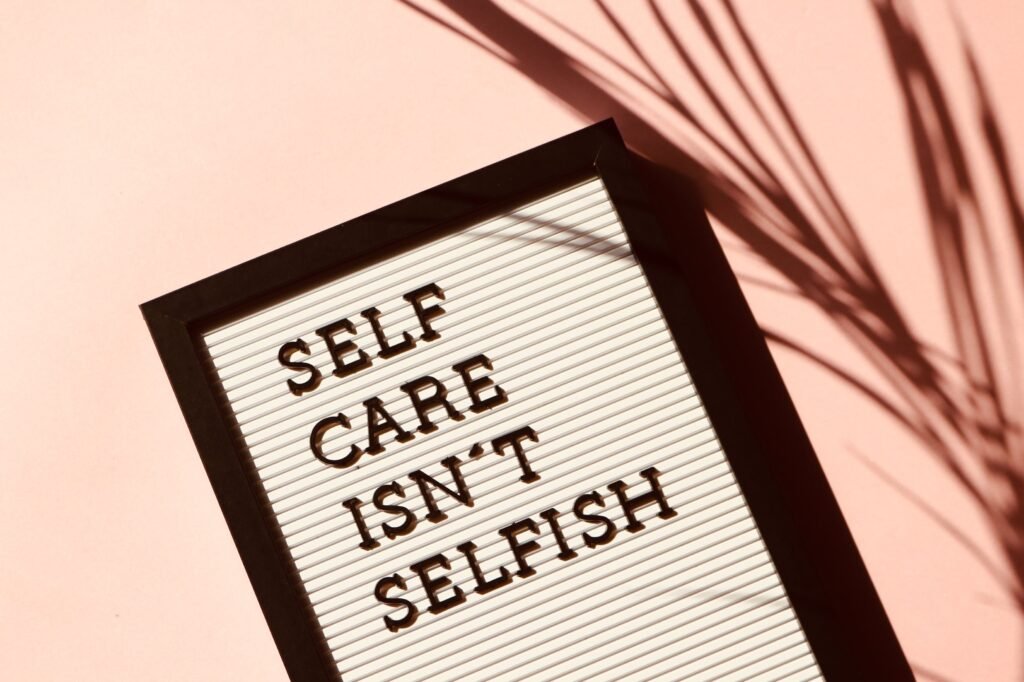
Before going into specific advice, it is important to know what mental health means. Our emotional, psychological and social well-being are all considered aspects of our mental health. It affects every area of our lives, including our relationships and productivity at work, by influencing our thoughts, feelings and behaviors. Avoiding obstacles or uncomfortable feelings is not necessary to maintain good mental health. It’s about building resilience and arming yourself with the means to handle life’s ups and downs. In addition to taking good care of our bodies through exercise and a healthy diet, we also need to actively promote our mental and emotional well-being.
Practical Tips for Enhancing Mental Wellness:
1.Prioritize Self Care:
Participating in activities that improve one’s mental, emotional, and physical health is a form of self-care. This can include things like:
- Get enough sleep Consume a diet that is well-rounded.
- Exercise regularly.
- Making time for leisure activities and relaxation Engaging in mindfulness or meditation exercises
Taking time for self-care is not selfish. It is essential to maintain overall health.

2.Build strong support networks:
Connecting with others is vital to maintaining good mental health. Building relationships with friends, family members, or support groups can provide a sense of understanding, empathy, and encouragement. Having a strong support network creates a sense of belonging and reduces feelings of isolation. When we have people we can trust, share our experiences with, and lean on during difficult times, it can significantly improve our overall well-being. . Whether it’s a deep conversation with a trusted friend, a heartfelt exchange with a family member, or the camaraderie found in a support group, these connections play an important role in our mental and emotional health. They offer comfort in times of trouble, celebrate our successes, and remind us that we are not alone in navigating life’s challenges. By nurturing these relationships and fostering genuine connections, we can create a supportive environment that contributes positively to our mental well-being.
3.Practice Stress Management Techniques:
Stress is an unavoidable aspect of our daily lives, yet when it becomes chronic, it can significantly affect our mental health. Managing stress effectively is essential to maintaining overall health. Various techniques, such as deep breathing exercises, progressive muscle relaxation, and mindfulness meditation, offer effective strategies for reducing stress and promoting mental flexibility. Deep breathing exercises encourage relaxation by slowing breathing and activating the body’s relaxation response. Progressive muscle relaxation involves systematically tensing and relaxing different muscle groups to release tension and promote a sense of relaxation. Mindfulness meditation promotes present-moment awareness, allowing individuals to observe their thoughts and feelings without judgment, which can reduce stress and anxiety levels. By incorporating these stress management techniques into our daily routine, we can better cope with life’s challenges and protect our mental well-being. It is important to recognize that stress management is not about eliminating stress completely, but rather developing healthy coping mechanisms to navigate stress more effectively. With practice and persistence, individuals can develop greater resilience and live healthier, more balanced lives.
4.Set sensible objectives:
Setting achievable goals plays an important role in boosting self-esteem and developing a sense of direction in life. Breaking down big aspirations into smaller, more manageable tasks enables individuals to approach their goals with clarity and determination. By breaking down goals into bite-sized steps, progress becomes clearer, and the journey feels less daunting. Additionally, celebrating small successes along the way serves as motivation to keep going. It is very important to avoid comparing yourself to others, as everyone’s path is unique, and simply comparing can create unnecessary stress and self-doubt. Instead, focusing on personal growth and acknowledging your progress is the key to maintaining momentum. By embracing one’s journey and celebrating personal victories, individuals can develop a positive mindset and stay motivated to achieve their goals. Remembering that growth is a journey, not a destination, empowers individuals to persevere through challenges and ultimately achieve their aspirations.
5.Establish Healthy Boundaries:
Establishing and maintaining healthy boundaries is a fundamental aspect of nurturing balanced relationships and protecting mental well-being. Knowing when to say no is an important skill that enables individuals to prioritize their own needs and avoid overwhelming themselves with commitments. Clear communication of personal boundaries is equally important, as it creates transparency in the relationship and ensures that others understand one’s boundaries. Learning to articulate needs and boundaries helps prevent stress and resentment that can result from unmet expectations. Equally important is recognizing and respecting the boundaries set by others, fostering an environment of mutual understanding and respect. By acknowledging and respecting the personal space and boundaries of those around us, we contribute to the creation of healthy, supportive relationships. Healthy boundaries serve as a form of self-care, allowing individuals to maintain a sense of autonomy, protect their emotional well-being, and develop relationships based on trust and mutual respect. In the delicate balance of interpersonal relationships, establishing and recognizing boundaries plays an important role in the overall health and harmony of the relationship.
6.Seek Professional Support When it Needed:
If you are experiencing challenges with your mental health, it is important to recognize the importance of seeking help from a mental health professional. Whether through therapy, counseling, or psychotherapy, these pathways offer invaluable support and guidance tailored to your specific needs. It is important to understand that reaching out for help is not an admission of weakness, but a courageous acknowledgment of your own goodness. Mental health professionals are equipped with the skills to provide compassionate support and evidence-based interventions to help you get through difficult times. By seeking professional help, you gain access to a confidential space where you can openly express your thoughts and feelings without fear of judgment. Remember, you are not alone in your struggles, and seeking help is an active step toward self-care and healing. Embracing the journey to mental health is an act of self-compassion and resilience, a commitment to prioritizing your overall well-being. So, don’t hesitate to reach out for help when needed. It is a powerful testament to your strength and determination to live a full and balanced life.

